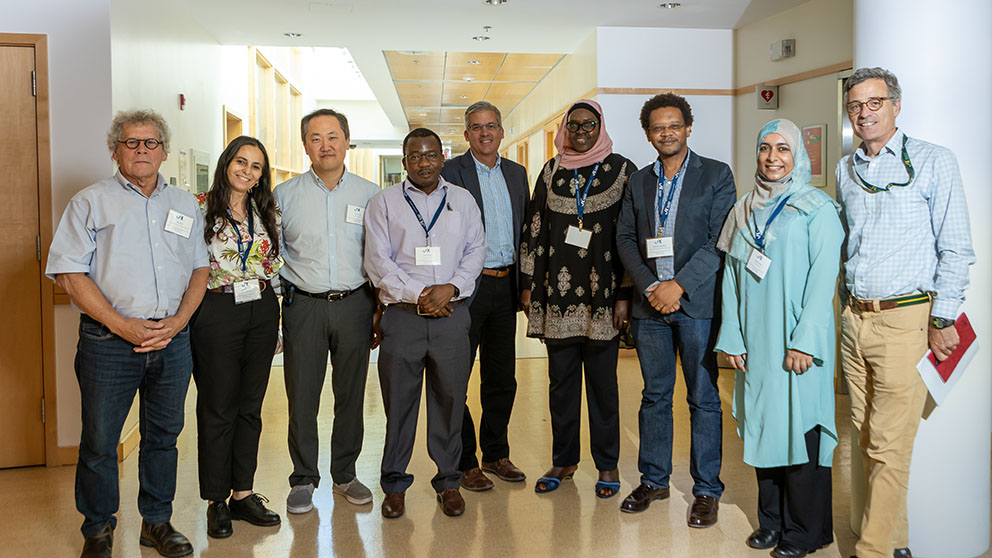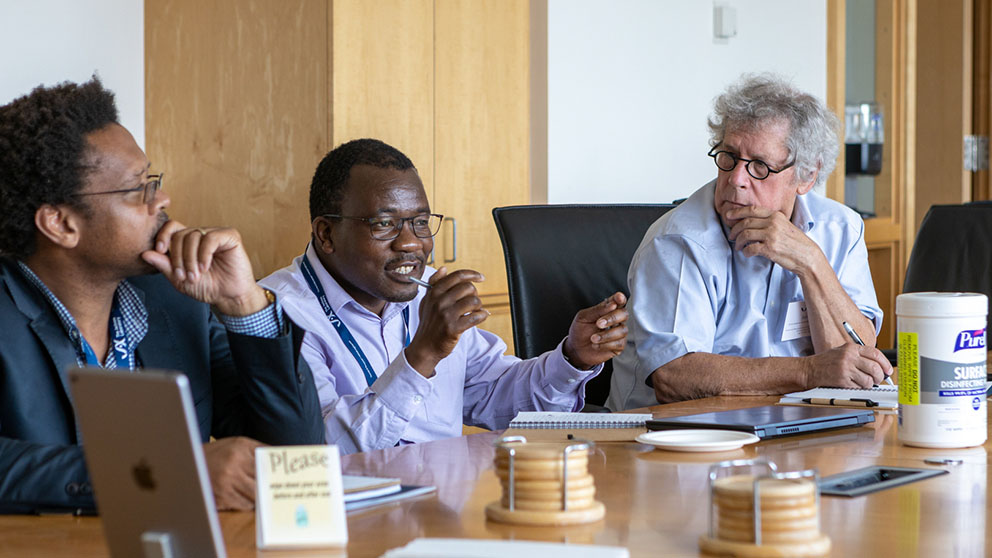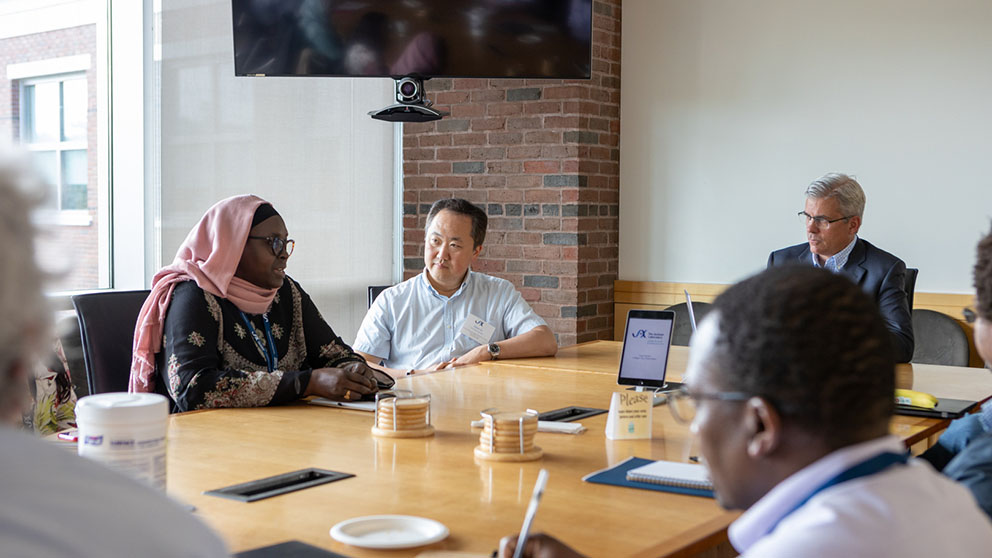 (l to r) David Valle, Professor, McKusick-Nathans Department of Genetic Medicine, The Johns Hopkins School of Medicine; Ghada El Kamah, MD, PhD Human Genetics and Genome Research Institute, National Research Centre, Cairo, Charles Lee, Ph.D., FACMG, Scientific Director and Professor, The Jackson Laboratory for Genomic Medicine, Robert Alvine Family Endowed Chair; Dr Collett Dandara, PhD, Division of Human Genetics, University of Cape Town; Lon Cardon, Ph.D., FMedSci, President and CEO, The Jackson Laboratory; Rokhaya Ndiaye, PhD, Département de Pharmacie, UCAD, Sénégal; Ambroise Wonkam, Professor of Genetic Medicine, and Director of the McKusick-Nathans Institute, and Department of Genetic Medicine, Johns Hopkins University School of Medicine, Baltimore; Dr Shahida Moosa, MbChB, PhD, Division of Molecular Biology and Human Genetics, Faculty of Medicine and Health Sciences, Stellenbosch University; Charlie Wray, Ph.D., Vice President for Education, The Jackson Laboratory.
(l to r) David Valle, Professor, McKusick-Nathans Department of Genetic Medicine, The Johns Hopkins School of Medicine; Ghada El Kamah, MD, PhD Human Genetics and Genome Research Institute, National Research Centre, Cairo, Charles Lee, Ph.D., FACMG, Scientific Director and Professor, The Jackson Laboratory for Genomic Medicine, Robert Alvine Family Endowed Chair; Dr Collett Dandara, PhD, Division of Human Genetics, University of Cape Town; Lon Cardon, Ph.D., FMedSci, President and CEO, The Jackson Laboratory; Rokhaya Ndiaye, PhD, Département de Pharmacie, UCAD, Sénégal; Ambroise Wonkam, Professor of Genetic Medicine, and Director of the McKusick-Nathans Institute, and Department of Genetic Medicine, Johns Hopkins University School of Medicine, Baltimore; Dr Shahida Moosa, MbChB, PhD, Division of Molecular Biology and Human Genetics, Faculty of Medicine and Health Sciences, Stellenbosch University; Charlie Wray, Ph.D., Vice President for Education, The Jackson Laboratory.
The world-renowned Human and Mammalian Genetics and Genomics: The McKusick Short Course (known simply as the “Short Course”) in Bar Harbor, Maine, has educated and inspired thousands of trainees, established researchers, clinicians and others over its 64-year history.
Convening each July in the spectacular summertime setting of Bar Harbor, Maine, it has both observed and supported the implementation of medical genetics in mainstream clinical care during its proud history. But in 2022, it served as a gathering place for a group of prominent genetic and genomic researchers and clinicians from a continent not previously well represented: Africa.
Despite difficult travel logistics and the lingering effects of the COVID-19 pandemic, participants from Nigeria, Tunisia, Egypt, Mali, Senegal, DR Congo, Ghana and South Africa came to Bar Harbor to learn from talks at the Short Course as well as to learn about the course itself. Their discussions focused on how to bring wider human genetics and genomics education opportunities to Africa, an effort many years in the making and many years delayed by the pandemic. It had been a long and difficult path, but, at last, the pieces were coming together.
 (l to r) Ambroise Wonkam, Professor of Genetic Medicine, and Director of the McKusick-Nathans Institute, and Department of Genetic Medicine, Johns Hopkins University School of Medicine, Baltimore. Dr Collett Dandara, PhD, Division of Human Genetics, University of Cape Town. David Valle, Professor, McKusick-Nathans Department of Genetic Medicine, The Johns Hopkins School of Medicine
(l to r) Ambroise Wonkam, Professor of Genetic Medicine, and Director of the McKusick-Nathans Institute, and Department of Genetic Medicine, Johns Hopkins University School of Medicine, Baltimore. Dr Collett Dandara, PhD, Division of Human Genetics, University of Cape Town. David Valle, Professor, McKusick-Nathans Department of Genetic Medicine, The Johns Hopkins School of Medicine
Complementary initiatives
More than five years ago, researchers, clinicians and educators, including some of those who would later travel to Maine, gathered in Cairo, Egypt, for the tenth annual African Society of Human Genetics (AfSHG) conference. The conference theme was “Human Genetics and Genomics in Africa,” highlighting the previous decade’s work and progress. But behind the scenes, a group gathered to start planning how to expand human genetics education and research in Africa. Concurrently, the organizers of the Short Course were looking to address the need to provide new perspectives and increase course content about global genetic diversity. The course had a consistent record of success, but how could it expand its reach and impact still further?
Ultimately, the two complementary initiatives would begin to mesh and, despite considerable challenges, move forward. The planners in Africa had to address issues that their U.S. counterparts simply hadn’t faced, including the wide variety of cultures, academic schedules, infrastructure readiness, climates and different primary languages in countries throughout the vast African continent. But there was both a need for more human genetics expertise in Africa as well as a large amount of untapped trainee interest and talent, making the hard road forward well worth the effort.
 (l to r) Rokhaya Ndiaye, PhD, Département de Pharmacie, UCAD, Sénégal; Charles Lee, Ph.D., FACMG, Scientific Director and Professor, The Jackson Laboratory for Genomic Medicine, Robert Alvine Family Endowed Chair.; Lon Cardon, Ph.D., FMedSci, President and CEO, The Jackson Laboratory.
(l to r) Rokhaya Ndiaye, PhD, Département de Pharmacie, UCAD, Sénégal; Charles Lee, Ph.D., FACMG, Scientific Director and Professor, The Jackson Laboratory for Genomic Medicine, Robert Alvine Family Endowed Chair.; Lon Cardon, Ph.D., FMedSci, President and CEO, The Jackson Laboratory.
A global pandemic
For the 2019 Short Course, the Short Course organizers led by Vice President, Genomic Education Charles Wray, Ph.D., of The Jackson Laboratory (JAX) and David Valle, M.D., Director of the McKusick-Nathans Institute of Genetic Medicine at Johns Hopkins, invited Ambroise Wonkam, M.D., Ph.D., D.Med.Sc., director of the Genetic Medicine of African Populations (GeneMAP) program to increase representation of Africa’s populations in genome databases, to attend. Wonkam became AfSHG president the same year and would be named to direct Johns Hopkins Medicine’s Department of Genetic Medicine and the McKusick-Nathans Institute of Genetic Medicine in late 2021, succeeding Valle.
Wonkam, Wray, Valle and Guida Landoure, M.D., Ph.D., a Human Heredity & Health in Afrida (H3Africa) consortium member from Mali, subsequently gathered in Houston at the 2019 American Society for Human Genetics annual meeting. From those discussions Wray, in collaboration with Valle, applied for and secured institutional funding from JAX for a genomic education outreach project to build genetics and genomics capacity across Africa. Unfortunately, the momentum gained was short-lived, as the emergence of SARS-CoV-2 and the COVID-19 pandemic curtailed further planning and implementation efforts in 2020 and 2021, and the project had to be retracted for that time.
Establishing the basics
It was therefore with much enthusiasm and relief that the planning resumed in earnest at the 2022 Short Course. A new project grant made it possible for a larger group of eight African faculty to attend, leading to lively discussions. The meetings and planning were spearheaded by Wray, Wonkam and Christian Happi, Ph.D., professor of Molecular Biology and Genomics and Director of the World Bank-funded African Center of Excellence for Genomics of Infectious Disease at Redeemer’s University in Nigeria. Because of the variety of issues facing the group, the discussions were wide-ranging.

The participants noted that the focus of most genetics education and clinical care in Africa to this time has focused on infectious diseases such as tuberculosis and HIV, and that will need to be broadened. There is a need both for more general outreach and education to get talented students interested in genetics at a younger age, as well as to train graduate students and clinicians already preparing for or working in the field. Just the presence of the a companion course in Africa will help create a greater awareness of human genetics as a field, however. Teaching about cutting-edge research may not always be relevant in many areas, so mixing in more applicable subjects is desirable. But there is also the specific opportunity to explore the intersection between disease genetics and infectious disease genetics at a high level in Africa.
Next Steps
While many details remained open-ended after multiple discussions, significant progress has been made in the short time since the July meetings. In the months following the course, a NIH grant application was submitted by The University of Cape Town (South Africa), the AfSHG, JAX and Johns Hopkins to support three years of collaborative courses and workshops in South Africa, Egypt and Nigeria. Further planning took place in Rabat, Morocco, at the recent AfSHG/Moroccan Genetics Society meeting. And five additional African geneticists will attend the 2023 McKusick Short Course.
“The education team at JAX, along with the Short Course organizers remain excited and dedicated to building genomics capacity across Africa,” says Wray. “We are excited by progress so far and will continue to collaborate and seek grant funding for the launch of medical genetics and genetic-data science courses in collaboration with the African Society of Human Genetics.”